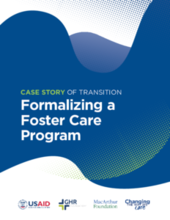Tara Garcia came to Honduras in 2004 as a teacher in her twenties and immediately witnessed the widespread disparities in private residential care (“orphanage care”) throughout the country. She saw firsthand how some orphanages provided bilingual learning services or closets of supplies to providing shoes for impoverished children. This disparity spurred Tara to create and direct a ministry that sought to fill in the gaps in care for children without parental care; one that aimed to focus on family. In 2010, Tara moved to Honduras full-time to run this ministry and fulfill its mission.
Tara started programs to provide everything from dentistry to fruits and vegetables to age-appropriate Bibles. After three years of work, the network had grown and the ministry had connected to over 45 orphanages throughout Honduras. In hopes of providing greater opportunities for networking and sharing resources and best practices, they also began to host a regional orphan care conference; the first of its kind in Honduras. After working with the ministry for eight years, Tara began to notice that youth who had aged out of the orphanage system were having their own children brought back into residential care. These observations were confirmed by others in the network who noticed a similar trend. Tara realized that much of the work trying to fill in the gaps was simply putting a Band-Aid on a badly broken system. Despite their best efforts, the ministry was not having the impact that they were hoping to see. The improved services in orphanages were not helping to prevent children from entering the institutions. In 2015, Tara and her husband left the ministry to start Identity Mission - an organization dedicated to providing family-based care solutions in Honduras to vulnerable children alongside the local church. In collaboration with the Honduran Government, Identity Mission went on to establish the first formal system of foster care in the country.
This case story is meant to illustrate transition, the actors involved, the challenges and the success factors; recognizing that each transition is an individual process with different starting points, different dynamics and different evolutions.
This case story complements the Phases of Transition Interactive Diagram by illustrating one or more stages of change. The story of Identity Mission tells how a program focused on supporting vulnerable children by providing family-based care solutions alongside the local church came to be and what the challenges were to creating a mission focused on family. It is the story of one person’s own transition.
Related:

